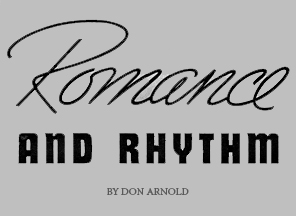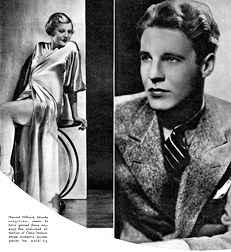In this installment of Snapshot in Prose, we pay a visit to Ozzie Nelson and his then-future wife, Harriet, in 1935, when they were performing together and hotly rumored to be an item behind the scenes. Ozzie, then unmarried, was a very popular bandleader and singer, and Harriet was his girl singer, a married woman (though not for long) awaiting her final divorce decree.
Ozzie and Harriet went on to huge television success in the 1950s, of course, and it’s for “The Adventures of Ozzie and Harriet” that they’re best remembered today. But it’s intriguing to revisit a time when they were recording stars, and hadn’t yet tied the knot.
As we learn from this story, from the June 1935 issue of Popular Songs magazine, they were both considered heart-throbs in their day, and one can’t help but wonder what advice they offered their son Rickie in the 1950s, when his star rose so suddenly and he became a teen idol.


 It seems inevitable that Ozzie Nelson and Harriet Hilliard should meet and fall in love. Their romance of the past two years had Broadway agog, but the principals, themselves would rather discuss almost anything else.
It seems inevitable that Ozzie Nelson and Harriet Hilliard should meet and fall in love. Their romance of the past two years had Broadway agog, but the principals, themselves would rather discuss almost anything else.
Why? For several reasons. One of them is said to be that Harriet has not yet received her final divorce papers from an almost mythical, out-of-sight, out-of-mind husband which she seems to have acquired somewhere, sometime; another is that too much attention of their interest in each other might slow down the millions of debs who regard Ozzie with wide eyes of admiring wonder and the college boys who flock nightly to the ringside tables wherever Harriet is appearing.
Both Ozzie and Harriet might be called grown-up child prodigies who, contrary to general rule, made good. A cursory glance at Ozzie’s record will suffice to show that musically and romantically he was destined to be a leader.
He was born in Jersey City, New Jersey, in March, 29 years ago. He was christened Oswald George Nelson but there is no record that during his school days he was taunted with cries of “Oh Os—wald!” from his companions, for he was too rugged a lad to inspire such comment, and the consequences were feared.
Ozzie was the youngest Eagle Scout in the United States when he was 14, in 1920, and when the Boy Scout Jambouree went to Europe for the Olympic games, he and his brother sang together before King Albert of Belgium.
At Rutgers University Ozzie was the campus leader of the class of 1927. He played quarterback on the football team, but was never on the hypothetical All-American team and wishes that people would stop saying that he was. He starred also on the swimming, boxing and lacrosse teams and these sports together with his football made him a four-letter man.
Aside from athletics he won the college oratorical contest in his senior year, was captain of the debating team, art editor of the Rutgers Chanticleer and a contributor to several national humor magazines. No one, especially Ozzie, seems to know how he found spare time in which to organize his own orchestra and book it for dances during the lulls between athletic seasons, but he did it.
In music as in almost everything he has ever done Ozzie experienced practically no difficulty. He was blessed with three generations of music teachers on his mother’s side of the family and his father, a banker, was an enthusiastic amateur musician who coached amateur theatricals and minstrel shows. Ozzie had sung in some of these and had taken up the study of the violin when 13. He added the banjo and saxophone to his list during his high school days. After his graduation from Rutgers Ozzie attended the New Jersey law school, obtaining an LL.B. degree in 1930.
With his father’s death, it became necessary for him to earn his own way through school and this he did by playing the banjo or saxophone in local dance orchestras and coaching the Lincoln high school football team in Jersey City during 1929 and 1930. Nelson had also organized a band of his own again and made considerable money by playing for private engagements and for a sponsored series of radio progarms over a New York station.
Then came the break he has been waiting for and he and orchestra composed almost entirely of musicians who had never served as professional music-makers with any other band were booked into the Glen Island Casino. There he began broadcasting over the major radio networks and he was soon well on the road to national recognition as an orchestra leader of skill.
Sometime during his very early youth a little bundle of blondeness christened Peggy Lou Snyder had been born to very proud parents in Des Moines, Iowa. It wouldn’t be quite fair to say that she was born in a costume trunk (as the theatrical saying has it for babes of the stage) but she did the next best thing and made her professional appearance in front of the footlights when only six weeks old.
Her father, a stage director, and her mother, an actress, brought her on the stage for her debut in a cradle. Ever since then she has been busy in child parts at first and singing and dancing later on. Her parents made her take time out however to attend St. Agnes Academy in Kansas City, Missouri [Editor’s Note: Joan Crawford attended the same school from 1916 through 1919], where she was captain of the basket-ball team and a member of the swimming team.
Peggy Lou studied ballet dancing under the direction of Chester Hale and at 15 was in vaudeville where she appeared at various times with such headliners as Bert Lahr and Ken Murray. She made a total of six swings around the vaudeville circuits from Canada to Florida and New York to California. Along the way some place she changed her name professionally to Harriet Hilliard and in 1931 she was featured on Broadway at the Hollywood restaurant as mistress-of-ceremonies.
It was in the Hollywood restaurant that Ozzie first saw Harriet. He saw the girl who could be his companion on the road to greater heights. He had some trouble prying her loose from the Hollywood management but he was able to do it after convincing her that she should sing with him and his band at the Glen Island Casino. They introduced the boy and girl duet idea and even today he is still the only orchestra leader of any great reputation who sings numbers of this type with unvarying success.
Ozzie—blond, wavy-haired and handsome—is single and insists that he intends to remain so for some time. He directs his band and sings solos. Harriet slips out from behind the bandstand to sing duets with him occasionally. The greatest fun in their lives is the Baker’s Broadcast with Joe Penner. Ozzie and Harriet try to explain the idea of romance by insisting that their work throws them together so constantly that people misinterpret their close association, but it seems to us that if Harriet had other boy friends (and she could have) they would take her home at night, but this is a privilege that Ozzie reserves for himself.

